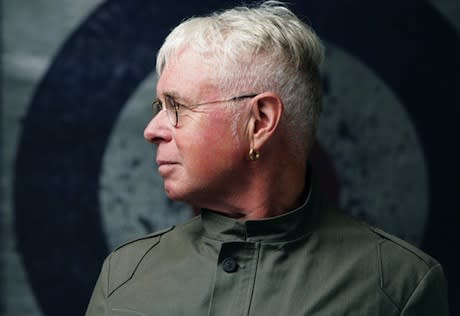While he makes it clear he'd rather be known as the "Canadian Bob Dylan" than the "Canadian John Denver," Bruce Cockburn is very much a musician that defies comparisons. Though documentary Pacing The Cage may be padded with a few too many of his close friends singing his praises, it's wise enough to allow Cockburn to take centre stage, for the most part, and speak for himself in both words and song.
Far from being a comprehensive overview of the various phases of Cockburn's illustrious career, the film instead follows the singer-songwriter on a short solo tour in support of a new album. Leaning heavily on live performances of classic songs like "Lovers in a Dangerous Time" and "Wondering Where the Lions Are," fans will be pleased by the uninterrupted concert footage and insight into how some of the tunes were crafted.
Separated into chapters that focus on his virtuosic guitar playing, his work as an activist and his influential abilities as a songwriter, there's an emphasis on his depth of character and spirituality, rather than the breadth of his work. To help illustrate these exemplary traits, fellow artists like Jackson Browne, Michael Ondaatje and even Bono (who makes a brief appearance) provide more reliable and less biased testimonials than interviews with Cockburn's manager (and co-producer of this film), Bernie Finkelstein, and frequent album producer Colin Linden.
Even those who may not find Cockburn's music their cup of tea would be hard-pressed to dismiss both his talent and how articulate he is in discussing his accomplishments. It's rare enough to find a musician with his kind of lyrical prowess that's also capable of indulging in an otherworldly extended guitar solo, but it's even more refreshing to find one that possesses all of these abilities with barely a hint of ego.
Though it's hard to capture the essence of someone as complicated as Bruce Cockburn in a film that runs only a little over an hour, there are enough candid glimpses to show how his art is clearly the utmost of his concerns. The reason his songs endure and are so frequently covered by other artists is because they originate from such an honest place.
For example, there's a telling passage in which he talks about writing the great protest number "If I Had A Rocket Launcher" after learning of the plight of the Guatemalan refugees. Holing up in his hotel room with only a bottle of alcohol and his guitar, the way he remembers shedding many tears the night of its genesis is a testament to the therapeutic power of music.
(Indiecan)Far from being a comprehensive overview of the various phases of Cockburn's illustrious career, the film instead follows the singer-songwriter on a short solo tour in support of a new album. Leaning heavily on live performances of classic songs like "Lovers in a Dangerous Time" and "Wondering Where the Lions Are," fans will be pleased by the uninterrupted concert footage and insight into how some of the tunes were crafted.
Separated into chapters that focus on his virtuosic guitar playing, his work as an activist and his influential abilities as a songwriter, there's an emphasis on his depth of character and spirituality, rather than the breadth of his work. To help illustrate these exemplary traits, fellow artists like Jackson Browne, Michael Ondaatje and even Bono (who makes a brief appearance) provide more reliable and less biased testimonials than interviews with Cockburn's manager (and co-producer of this film), Bernie Finkelstein, and frequent album producer Colin Linden.
Even those who may not find Cockburn's music their cup of tea would be hard-pressed to dismiss both his talent and how articulate he is in discussing his accomplishments. It's rare enough to find a musician with his kind of lyrical prowess that's also capable of indulging in an otherworldly extended guitar solo, but it's even more refreshing to find one that possesses all of these abilities with barely a hint of ego.
Though it's hard to capture the essence of someone as complicated as Bruce Cockburn in a film that runs only a little over an hour, there are enough candid glimpses to show how his art is clearly the utmost of his concerns. The reason his songs endure and are so frequently covered by other artists is because they originate from such an honest place.
For example, there's a telling passage in which he talks about writing the great protest number "If I Had A Rocket Launcher" after learning of the plight of the Guatemalan refugees. Holing up in his hotel room with only a bottle of alcohol and his guitar, the way he remembers shedding many tears the night of its genesis is a testament to the therapeutic power of music.
